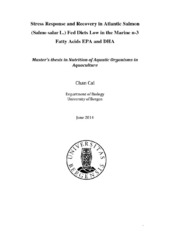Stress Response and Recovery in Atlantic Salmon (Salmo salar L.) Fed Diets Low in the Marine n-3 Fatty Acids EPA and DHA
Master thesis
Permanent lenke
https://hdl.handle.net/1956/8551Utgivelsesdato
2014-06-01Metadata
Vis full innførselSamlinger
Sammendrag
With the fast growth of today's aquaculture industry, the demand for aquafeeds is expanding dramatically. Finding sustainable alternative sources to fishmeal and fish oil (FO) is becoming an urgent issue; vegetable oil (VO) and plant meal are potential candidates. Replacing the fishmeal and FO with plant materials means fish eat low levels of polyunsaturated fatty acids including eicosapentaenoic acid (EPA) and docosahexaenoic acid (DHA); this may affect the fish growth and health such as stress response. The objective of this study was to investigate the effect of low level of dietary EPA and DHA on stress response in Atlantic salmon (Salmo salar L.). Atlantic salmon were fed four diets with increasing levels of EPA and DHA, ranging from 1.3% to 7.4% of total dietary fatty acids (FAs) for five months. All diets contained 10% fishmeal of the total diets, and the reminder of protein was provided by plant sources. To examine the effects of the different diet treatments on stress response, concentrations of plasma cortisol and glucose were analyzed before stress, and 1h, 2h and 23h after stress. The gene expression of stress protein HSP27 and the antioxidant enzymes (SOD1, CAT, GPx1), and SOD1enzyme activity in liver were tested at the same time points. Replacing dietary FO with vegetable oils significantly affect fish growth, the final weight of fish fed two lower levels of EPA and DHA (1.3% and 2.7%, respectively) was significantly lower than control group (7.4% EPA and DHA). Significantly higher SGR% and weight gain rate% were observed in fish fed 4.4% and 7.4% EPA and DHA compared to fish fed 1.3% and 2.7% EPA and DHA. A significantly lower concentration of plasma cortisol in diet C (4.4% EPA and DHA) compared to the control group was seen. No effect of the four diets was found on plasma glucose, transcription of HSP27, SOD1 CAT and GPx1 in liver, and SOD1 enzyme activity in liver.
